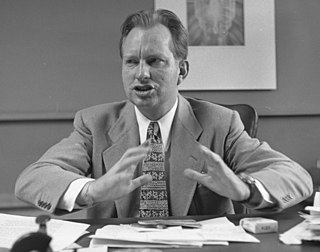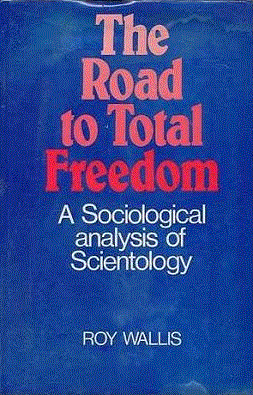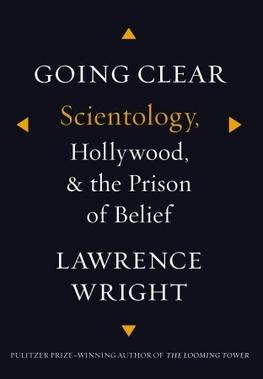
Dianetics is a set of pseudoscientific ideas and practices regarding the metaphysical relationship between the mind and body created by science fiction writer and Scientology founder L. Ron Hubbard. Dianetics is practiced by followers of Scientology and the Nation of Islam.

Lafayette Ronald Hubbard was an American author and the founder of Scientology. A prolific writer of pulp science fiction and fantasy novels in his early career, in 1950 he authored Dianetics: The Modern Science of Mental Health and established organizations to promote and practice Dianetics techniques. Hubbard created Scientology in 1952 after losing the rights to his Dianetics book in bankruptcy. He would manage the Church of Scientology until his death in 1986. Born in Tilden, Nebraska, in 1911, Hubbard spent much of his childhood in Helena, Montana. While his father was posted to the U.S. naval base on Guam in the late 1920s, Hubbard traveled to Asia and the South Pacific. In 1930, Hubbard enrolled at George Washington University to study civil engineering but dropped out in his second year. He began his career as a prolific writer of pulp fiction stories and married Margaret Grubb, who shared his interest in aviation.

Xenu, also called Xemu, is a figure in the Church of Scientology's secret "Advanced Technology", a sacred and esoteric teaching. According to the "Technology", Xenu was the extraterrestrial ruler of a "Galactic Confederacy" who brought billions of his people to Earth in DC-8-like spacecraft 75 million years ago, stacked them around volcanoes, and killed them with hydrogen bombs. Official Scientology scriptures hold that the thetans of these aliens adhere to humans, causing spiritual harm.

The Church of Scientology maintains a wide variety of beliefs and practices. The core belief holds that a human is an immortal, spiritual being (thetan) that is resident in a physical body. The thetan has had innumerable past lives, some of which, preceding the thetan's arrival on Earth, were lived in extraterrestrial cultures. Based on case studies at advanced levels, it is predicted that any Scientologist undergoing auditing will eventually come across and recount a common series of past-life events.

The Sea Organization is a core group of Church of Scientology staff members who have signed a billion-year pledge of service to Scientology. All Scientology management organizations are controlled exclusively by members of the Sea Org. David Miscavige, the de facto leader of Scientology, is the highest-ranking Sea Org officer, holding the rank of captain.

Stephen A. Kent is a professor in the Department of Sociology at the University of Alberta in Edmonton, Alberta, Canada. He researches new religious movements (NRMs), and has published research on several such groups including the Children of God, the Church of Scientology, and other NRMs operating in Canada.

Scientology founder L. Ron Hubbard explicitly compared his teachings to the science-fiction subgenre space opera. In his writings, wherein thetans were reincarnated periodically over quadrillions of years, retaining memories of prior lives, to which Hubbard attributed complex narratives about life throughout the universe. The most controversial of these myths is the story of Xenu, to whom Hubbard attributed responsibility for many of the world's problems.

Suppressive person, often abbreviated SP, is a term used in Scientology to describe the "antisocial personalities" who, according to Scientology's founder L. Ron Hubbard, make up about 2.5% of the population. A statement on a Church of Scientology website describes this group as including notorious historic figures such as Adolf Hitler.

The Church of Scientology is a group of interconnected corporate entities and other organizations devoted to the practice, administration and dissemination of Scientology, which is variously defined as a cult, a business, or a new religious movement. The movement has been the subject of a number of controversies, and the Church of Scientology has been described by government inquiries, international parliamentary bodies, scholars, law lords, and numerous superior court judgements as both a dangerous cult and a manipulative profit-making business. In 1979, several executives of the organization were convicted and imprisoned for multiple offenses by a U.S. Federal Court. The Church of Scientology itself was convicted of fraud by a French court in 2009, a decision upheld by the supreme Court of Cassation in 2013. The German government classifies Scientology as an unconstitutional sect. In France, it has been classified as a dangerous cult. In some countries, it has attained legal recognition as a religion.

Gerald "Gerry" Armstrong is a critic of the Church of Scientology and a former member. As an archivist and assistant to L. Ron Hubbard's biographer, he discovered the truth about Hubbard's life history which impugned the Church's fantastic and idealized version. When Church management refused to correct the record, Armstrong left Scientology with copies of some of the documents. For decades he was harassed by the Church and pursued through the court systems, bankrupting him, in an attempt to keep the materials and facts undisclosed. But with each successive court case, more documents were inevitably disclosed as evidence and became part of the court's records and accessible to the public.

History of Dianetics and Scientology begins around 1950. During the late 1940s, L. Ron Hubbard began developing a mental therapy system which he called Dianetics. Hubbard had tried to interest the medical profession in his techniques, including the Gerontological Society, the Journal of the American Medical Association, and the American Journal of Psychiatry, but his work was rejected for not containing sufficient evidence of efficacy to be acceptable.
The Church of Scientology publicly classifies itself as a religion, but scholars and other observers regard it as a business, because the organization operates more like a for-profit business than a religious institution. Some scholars of sociology working in religious studies consider it a new religious movement. Overall, as stated by Stephen A. Kent, Scientology can be seen as a "multi-faceted transnational corporation that has religion as only one of its many components. Other components include political aspirations, business ventures, cultural productions, pseudo-medical practices, pseudo-psychiatric claims, and, an alternative family structure."

Scientology is a set of beliefs and practices invented by the American author L. Ron Hubbard, and an associated movement. It is variously defined as a cult, a business, or a new religious movement. Hubbard initially developed a set of ideas that he called Dianetics, which he represented as a form of therapy. An organization that he established in 1950 to promote it went bankrupt, and Hubbard lost the rights to his book Dianetics in 1952. He then recharacterized his ideas as a religion, likely for tax purposes, and renamed them Scientology. By 1954 he had regained the rights to Dianetics and founded the Church of Scientology, which remains the largest organization promoting Scientology. There are practitioners independent of the Church, in what is called the Free Zone. Estimates put the number of Scientologists at under 40,000 worldwide.

The Road to Total Freedom: A Sociological Analysis of Scientology is a non-fiction book about Scientology by sociologist Roy Wallis. Originally published in 1976 by Heinemann, it was republished in 1977 by Columbia University Press. The original manuscript was the product of Wallis's doctoral research at Oxford under the tutelage of Bryan Wilson. Wallis, after a review of the original manuscript by Scientology leaders, made edits to about 100 passages before publication.

L. Ron Hubbard was the inventor of Dianetics and founder of Scientology. Born in Tilden, Nebraska in March 1911, Hubbard grew up with his family in Helena, Montana. He was unusually well-traveled for a young man of his time due to his father's frequent relocations in connection with his service in the United States Navy. He lived in a number of locations in the United States and traveled to Guam, the Philippines, China, and Japan. He enrolled at George Washington University in 1930 to study civil engineering, but dropped out in his second year. While at GWU, he organized an expedition to the Caribbean for fellow students which looms large in his official biography but was a flop according to contemporary accounts. He subsequently spent time in Puerto Rico panning for gold, before returning to the United States, marrying his pregnant girlfriend, and embarking on a career as a "penny-a-word" writer.

Going Clear: Scientology, Hollywood, and the Prison of Belief is a 2013 non-fiction book about Scientology written by Lawrence Wright.

Scientology is in part derived from, and shares elements with, a number of esoteric or occult systems. The extent of the influence of specific occult belief systems on Scientology is a subject of debate amongst scholars.
Hugh Bayard Urban is a professor of religious studies at Ohio State University’s Department of Comparative Studies and author of eight books and several academic articles, including a history of the Church of Scientology, published by Princeton University Press in 2012.
This is a bibliography of books critical of Scientology and the Church of Scientology, sorted by alphabetical order of titles.








